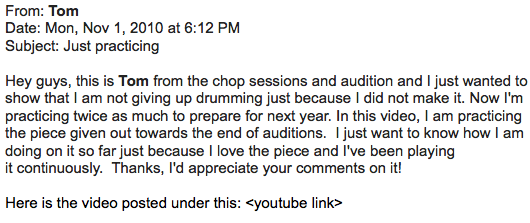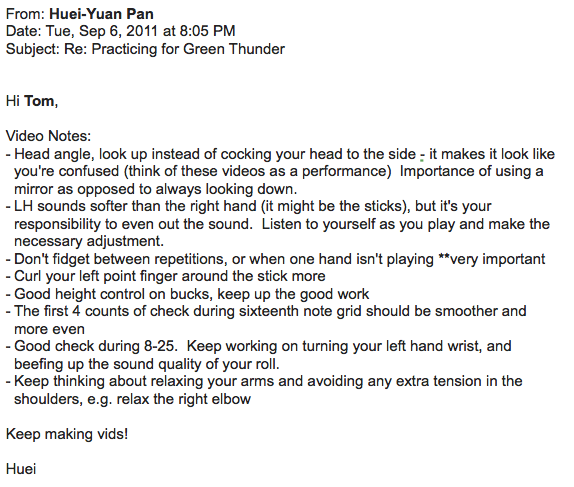
When you’re not chosen, it can shake your sense of purpose or belonging. It’s gonna hurt, but take a lesson from the worst snare drummer I’ve ever seen.
Listen to audio version or read below
Getting cut – it’s a feeling that stings even for those with thick skin. Trying out for a sports team, applying for school, interviewing for a job, taking an audition – these all have a lot in common. The process requires you to put yourself out there, make yourself vulnerable, and expose yourself to judgement, all in hopes of winning a spot. We’ve all been there, myself many times, and it can be stressful, right?
But being on the other side of the arena can also be tough. It wasn’t until I had to cut someone for the first time did I realize how much goes into deciding who makes the team, gets admitted, or wins the job. You quantify what you can to stay objective and minimize some of the struggle, but at some point the process requires you to use your instinct and gut reaction. Meanwhile, you can’t help but feel empathy for the other person’s inner turmoil – sweaty palms, eagerness to present themselves well, forced smile to seem comfortable, but not too comfortable because they’re trying to figure out how to demonstrate they’re “a team player.” Ugh, terrible. You’re a considerate person, and considerate people don’t want others to feel bad.
But hey, guess what – everyone gets cut at some point. If you’re not getting cut or failing somewhere along the way, this means you’re not reaching high enough. In fact, getting cut is something to celebrate – it’s a sign that you’ve moved outside your comfort zone, which is necessary for growth and development. Failing is just one of the many steps along the way to your next success.
So what do you do when you get cut? Was it all for nothing? Author William Feather wrote, “Success seems to be largely hanging on after others have let go.” That may be the case, but what you do while you’re “hanging on” also plays a large part in your success the next time opportunity presents itself.
As a teacher, seeing what people do in the face of failure fascinates me. This is especially pertinent when working to teach students and employees to become independent learners.
This is the story of me cutting the worst snare drummer I’ve ever seen.
–
Flashback
When I lived in Chicago, I spent my weekends teaching an indoor winter percussion group called Green Thunder Percussion. This group started in the smallest WGI competitive division, A Class, and over the years, grew into Open Class, and eventually World Class, now known as Cavaliers Indoor Percussion.
We started the group as an educational program sponsored by The Cavaliers Drum and Bugle Corps with the intention of developing local Chicagoland talent. Our mission was to add value to the percussion community by providing world-class level instruction and percussion pedagogy for students. This would ultimately help prepare them for auditions at the performance level of the main drum corps. Some students didn’t have percussion instructors at their schools, while others did and just wanted more teaching and learning time. Things we all had in common were a love for music, and hunger for getting better at drumming and percussion.
Chop Sessions
One initiative we used to help students prepare for audition weekend included “Chop Sessions” in the weeks preceding. Afternoon drum sessions were hosted as educational camps which allowed students to feel more comfortable around the instructors, get feedback on how to improve, as well help acclimate staff and members on how to best work together.
Now as teachers, we work with many different kinds of students. Some arrive ready to learn, others need to be motivated. Some are naturally talented, others have to rely on their diligence to make up for their lack thereof. At one particular chop session, I remember meeting a student who was immediately distinctive because of how attentive, focused, and polite he was – exactly the kind of student we were looking for. The only thing was, he was the worst snare drummer I’d ever seen.
For this blogpost, let’s call him Tom. Early high school. Posture – scared. Sticks – both slicing out. Hands – totally jacked. Feet – complete disaster and in a different time zone. The list went on. But at the same time, the kid was just so darn nice.
Now I’ve always been more than happy to work with any student, especially if they demonstrate the right attitude and desire to learn. There are students who come to you with no musical background, formal or informal experience. In fact, starting a total beginner and taking them from zero to 60 is one of the most gratifying perks that comes with teaching.
On the flip side, teaching students who have some experience, but have also developed undesirable habits, can actually be more difficult. Your goal then becomes helping them create new habits, some of which are proximally close to the undesirable habits. Having them discriminate between correct and incorrect is just one aspect, further complicated by them being human, and wanting to do what’s comfortable. If they’re not constantly self-monitoring and making an active effort to change the habit, then most likely, the undesired habit will continue to be reinforced.
How am I going to fix Tom?
Cut
To make matters more difficult, Tom came back for multiple chop session weekends. He’s attentive, focused, polite – AND committed?! Each time, I offered feedback, he nodded, and you could see him working to change those habits he had ingrained over hours of practice. But these things don’t happen overnight. Creating the dexterity and precision necessary to play music beautifully comes from many hours of correct repetitions. He was still, to put it lightly, awful. I distinctly remember thinking in an endearing way, “Wow, this poor guy is THE worst snare drummer I’ve ever seen.”
Finally, audition weekend came and Tom dutifully showed up. It wasn’t really close, and although he had done all the right things, he just needed more time to adjust his technique, figure out some coordination issues, and get stronger as a player. We finished ranking all the auditionees over the weekend, and there was just one last thing to do before officially welcoming the new members.
I remember the dread of having to call in the students who didn’t make the callback, and having to break the news to them that they’d been cut. The sea of disappointment plastered on a classroom full of student faces is what some might describe as “the worst.” I explained how many talented players had shown up for the audition, and because there were a limited number of spots, we unfortunately would not be able to accept everyone. I then made the teaching turn where I spin the positive: thank them for their effort, invite them to stay connected to the group and return to audition next year. While I was encouraging the students to keep working and stay motivated, Tom was standing at the back of the room with a smile on his face and nodding the entire time. He’s optimistic too?!
Because I could tell most of the younger students still felt a little poo-poo, I made a last-ditch offer that they could send me a video of themselves playing, and that I’d watch them and offer some feedback in preparation for next year (this was pre-fatherhood when I had the luxury of this thing called Time). I made one last hurrah, and encouraged by the student smiles, decided it would be a good closing point and called the meeting to an end.
As the students and parents fanned out, Tom approached me and thanked me for a great weekend. You could tell he felt the sting of being cut, but was still positive about the whole experience, and he even told me he would send a video. I said, “Great, let’s do it, I’m happy to help however I can.” He smiled, we shook hands and parted ways.
Getting Better
A few weeks later, I received an email from Tom. Included was a YouTube link to the video he promised he’d send. While writing this blog post, I was actually able to find the original email (name and address edited):

I was mildly surprised and sent him a short list of some broad concepts – sound quality, stroke, timing. But what really surprised me was the following week, when I received another email and video. I sent back another list of feedback. As more videos came, I saw the improvement in Tom’s playing. The hours he spent shedding in the basement to form new habits and get stronger were paying off. The playing got better, and the comments became more specific. All in all, Tom sent me videos for an entire year, all the way until the next audition. Here’s a note I sent him one week before the following year’s audition:

Although I’d been helping Tom with video feedback, my good friend, Billy, was the snare tech who would ultimately set the snare line. The audition took place over the weekend from Friday-Sunday.
So, what happened, you ask?
When the dust cleared, I’m happy to say Tom won a snare spot for the season.
Have you ever seen someone do something and thought, “I want to do THAT.”
Say goodbye to the days where you wondered what you should be practicing, and welcome the confidence of knowing you are setting yourself up for success.
LEARN MORE
Epilogue
In the end, the worst snare drummer I’ve ever seen became one of the most tremendous students I’ve had the pleasure of teaching. He went on to march with the indoor group, become the center snare, march DCI, and also become center snare at a Top 12 drum corps. He’s now double majoring in music education and performance, and a success story I often share with my current students.
By no means was the video feedback the sole source of Tom’s success. He had many great teachers, friends, and parents helping him along the way. It was also because of his personal qualities that helped him find success. 5 takeaways from Tom you can keep in mind if you get cut:
- Perseverance. Simple. Tom didn’t give up, and neither should you. Even if you’re terrible, just don’t give up. Check out Angela Lee Duckworth’s TED talk on Grit.
- Work ethic. Change doesn’t happen overnight. Big accomplishments come from many small steps over time. If you want the payoff, you gotta put in the time.
- Attitude. Stay positive, stay motivated. Make videos. Keep a journal. Find a friend or teacher for external accountability. Figure out what motivates you and do that. Try choosing one strategy this week, and add it to your daily work flow.
- Focus. Identify what you want, and focus on it by committing it to writing. At any moment, you should be able to ask yourself, “Is what I’m doing right now moving me closer to my goal?” It’s easy to get distracted when you lose focus on your goal.
- Feedback. Get feedback from people you trust. Benefit from their experience. Get an outside perspective so you can target and validate how you’re spending your time.
–
Thanks for Reading!
Hopefully you found some new information or reinforced what you already knew. How have you handled getting cut? How do you encourage people who get cut? I invite you to leave a note in the comment section below and share your thoughts!
If you enjoyed the post or know someone who might find it helpful, please share on your social media.
You can also send me a direct message via the contact page or find me on your social media platform of your choice. Let me know if you found this post helpful, any additional questions you might have, or just ask me how my day’s going – I appreciate it 🙂 Sub/follow to find out as more content comes out.
Most importantly, if you get cut, don’t give up – keep going!
Are you on Instagram?
ABOUT THE AUTHOR
Huei-Yuan Pan is a Los Angeles based musician via Chicago, originally from Houston. His drum corps experience includes performing with the Phantom Regiment Drum and Bugle Corps (Snare, 2001) and The Cavaliers Drum and Bugle Corps (Snare, 2002-2003; Front Ensemble, 2004). From 2008-2011, Huei served as Director and Arranger for Green Thunder Percussion, and in 2012-2013, Percussion Caption Head with Regiment. He is currently the Director of the Jumpstart Young Musicians Program at The Colburn School in downtown Los Angeles. For more on Huei, click here.
AVAILABLE PRODUCTS
Instantly download the MPP to your device so you can get to work. Individual Volumes or the Complete Edition available – start today!
SHOP NOW
Audition Founder’s Course
for WGI and DCI Auditions
WGI and DCI Auditions Founder’s Group
Sign up before November Auditions!
LEARN MORE






DCI was scouting at our high school and they looked at my best friend and at me. They chose my best friend over me but he told me that they wouldn’t pick me because I was a girl. I understand it wasn’t like they were carving out a spot for me or anything but the scouts were willing to pay for whoever they picked to go to training camps and take private lessons. So as much as this article helped me, DCI is just way to picky for me 🙂
LikeLike
Thank you so much for the story I’m really working towards my goal of auditioning for a DCI group for cymbals but my confiedence is there too much
LikeLike
I’ve been struggling with confidence lately and this really gave me the boost I needed to focus back on my goal. I’m only a sophomore in high school and I’m dying to make this incredible indoor percussion group on snare, but I’m terrified. I tried out my freshman year for experience and I was the only girl and practically everyone else was college-age. I’m going to keep working though. I hope to one day be good enough to make a DCI group. That story about Tom was just what I needed to get back in gear. Thank you for writing this and inspiring potential percussionists like me around the world!
LikeLiked by 1 person
Thank you, this really encouraged me. I’m in the exact same situation right now. I went to a camp last year (I’d only been playing for 4 months) and didn’t make it. Barely. I was kind of upset, but I resolved to work twice as hard. Slowly but surely, I’m getting there. I’ve been emailing the front ensemble instructor to make sure I’m progressing well. Hopefully if I keep working hard I can get a spot next year…
LikeLiked by 1 person
Thanks for the feedback, Raquel. Working hard is what you control…earning a spot is just the by product. Good luck and keep me posted!
LikeLike
Tom
I read this and it reminded me of lines I set in the past. I would tell some that I prefer the individuals that WANT to be in the line over those that can be. In additional I remember One spring at a H.S. I was working with a Baritone player ask me how he could make the tenor line. I looked at him with my most “Jersey ” like expression and said “practice”! I gave him some tips on technique and some parts to practice. In the fall, I was schooled to see the level that he achieved. He has since become a music educator and when I see him he always tells me the two things I taught him. 1. Anything is possible if you want it.
2. The only thing that you can’t do, is say you can’t do it.
That was an expression I have used for many years with lines I have instructed.
Many years of success to you .
Jim E
LikeLiked by 1 person
Thanks for reading and sharing, Jim!
LikeLike
Great article Huei-Yuan. Very reminiscent of my son’s journey. Tried out for a WC finalist corp in 2014 at drum set. They sent him home after a day. Came back in 15 and they told him he was a different drummer. He’ll March his second summer with them in 2016. An incredible character building experience.
LikeLiked by 1 person
Wanting something bad enough to continue working through the process of achieving your goals, despite the roads bumps, is one of the best lessons the activity teaches students. You must be very proud of your son 🙂 Thanks for sharing and thanks for reading, Jeff!
LikeLike
Awesome article and there is so much truth to it. This is really what defines the people who go on to succeed in many other things and its a great story to read.
LikeLike
Hi Evan, I agree – no giving up, and just keep driving!
LikeLike
Great article. Wise words and an awesome story.
LikeLike
Loved it! Well written and insightful. Don’t downplay your role in his success. The power of encouragement in the darkest of times can be amazingly powerful with students.
LikeLike
Thanks, Andy – I agree. A reminder for all of us teachers!
LikeLike
Fantastic article – I’ve shared on my Marching Arts Photography tumblr account – I hope you get lots of readers!
LikeLike
Thank you, Ann – I appreciate it!
LikeLike
Such a well written article with a great story and valuable life (not just drumming lessons). It’s not often that you see an article like this that is so well written but also extremely positive and passionate (not to mention the interactions with the students were extremely positive as well). I am also impressed by your humility, even though you are clearly an extremely skilled and proficient teacher. I’m looking forward to following your journey into the uncharted territories of the Social Media world 😉 lol
LikeLike
Thanks, Karl – you’re the kind of teacher that inspires me to share and provide value for our percussion/music community. Thanks for all the thoughtful feedback, I’m ready to write more – your enthusiasm is contagious!
LikeLike
I absolutely loved the article, the story is just fantastic and incredibly inspirational and I will definitely be sharing it with others 😁
LikeLike
Thanks for sharing and the feedback, Nick – I appreciate it!
LikeLike
This article really made me think about my past experiences with my instructors. Early on my front ensemble tech told me how to fix my technique and a “thank you” took him aback. Sure it was a small gesture but it isn’t heard a lot. Instructors are not there to say whats wrong with you but rather lead you in the right direction. Seriously great article, Huei-Yuan!
LikeLike
Great observation, Ricardo! You’re ability to learn from and work with your teachers is something that will help you go far in life 🙂 Thanks again for the feedback!
LikeLike
Great read!!!
LikeLike
There are some great lessons and advice in this article that are applicable in many ways. It’s not just about practicing and getting a spot. It’s about challenging yourself to become a better you, to finding your faults and pushing past that, and never giving up no matter what the odds are!
This is a great read, thanks for the article!
LikeLike
Yup, what a lovely summary! Thanks for the recap and additional insight, Kris!
LikeLike
Tom is a model of grit and resilience our students so desperately need to learn from. I couldn’t wait to read the end and find out what happened to Tom!
LikeLike
Ha, yes! I totally agree, Emily – I love the word “grit” after seeing Angela Lee Duckworth’s TED talk. That, that right there…we need more of that!
LikeLike
What a terrific article! Should be required reading for people nervous about trying out… there’s no shame in being cut, only in giving up.
LikeLike
I totally agree, Tom – thanks for the additional thoughts!
LikeLike
This is a GREAT article–thank you so much sharing it!!
LikeLike
This is a GREAT GREAT GREAT article! Thank you so much for sharing it.
LikeLike
Thanks for you checking out the post and the positive feedback, Ryan!
LikeLike
Great read, sir!
LikeLike
Thanks, Cary!
LikeLike
Parents of students should read this too… Great story.
LikeLike
Thank you, Linda!
LikeLike
Thanks for the shout-out regarding Tom! 🙂 Have you read Carol Dweck’s book on growth mindset? It’s a must-read for all educators. http://goo.gl/SwPpRm
LikeLike
Np, B! GREAT book, love how the content applies to teaching students growth mindset and our own practices as developing teachers. She has many great articles on the topic as well. Need to go back and re-read, thanks for sharing!
LikeLike
Wow, what a great story! Congratulations on all of your success and that of your students!
LikeLike
Hi, Brian! Likewise – really enjoy seeing all the progress you’ve been making with your kiddos as well 🙂
LikeLike
This is inspiring, friend. And knowing who you are as a teacher and person, not surprising in the least. Awesome.
LikeLike
Thanks so much, Ben – YOU inspire me 🙂 Dad, husband, musician, all the above!
LikeLike
Great thoughts! Thx for the call!
LikeLike
You bet, Q – thanks for being one of my percussion mentors!
LikeLike
Yes…Great post!
LikeLike
Thanks, Caroline – and thanks for putting up with me through my high school years 🙂
LikeLike
Great post, Huei!
LikeLike
Thanks for checking out the post, Ben!
LikeLike
Wow great article! I’m definitely sharing this with all of my students.
LikeLike
Thanks, Daniel – hope teaching is going well, keep me posted!
LikeLike